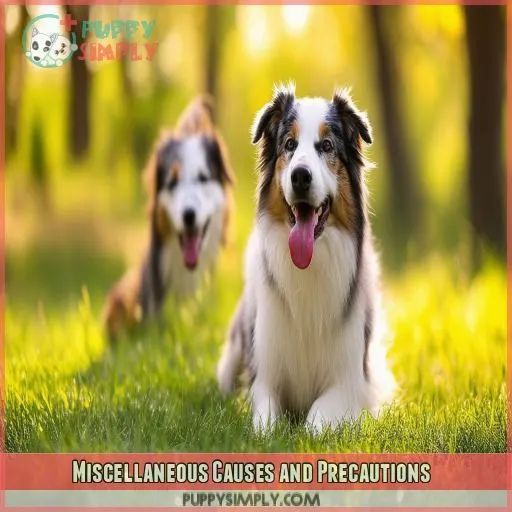This site is supported by our readers. We may earn a commission, at no cost to you, if you purchase through links.
 Ah, the curious canine tongue – a source of endless fascination for dog owners! Whether your pup’s tongue is casually peeking out or hanging loose, there’s often more than meets the eye.
Ah, the curious canine tongue – a source of endless fascination for dog owners! Whether your pup’s tongue is casually peeking out or hanging loose, there’s often more than meets the eye.
From relaxation and comfort to health conditions and emotional cues, this article explores the intricate reasons why dogs stick their tongues out, empowering you to better understand and care for your furry friend.
Table Of Contents
- Key Takeaways
- Why Do Dogs Stick Their Tongue Out?
- Reasons for Sticking Tongue Out
- Panting and Thermoregulation
- Hanging Tongue Syndrome
- Behavioral and Emotional Responses
- Miscellaneous Causes and Precautions
- Recognizing Relaxed Dogs
- Identifying Stressed and Nervous Dogs
- Frequently Asked Questions (FAQs)
- What does it mean when a dog sticks his tongue out?
- Why do dogs stick their tongue out and breathe fast?
- Why do old dog tongues hang out?
- Why do dogs stick their tongue out when they are tired?
- How can I keep my dogs tongue hydrated?
- Can an allergy cause tongue protrusion in dogs?
- Does diet influence tongue moisture in dogs?
- Are certain dog breeds prone to tongue injuries?
- Should I clean my dogs tongue regularly?
- Conclusion
Key Takeaways
- Dogs stick their tongues out for various reasons, including relaxation, cooling down, expressing happiness, and as a potential indicator of health issues.
- Observing a dog’s tongue behavior can provide insight into their emotional state, stress levels, and overall well-being, helping owners address their furry friend’s needs more effectively.
- Monitoring for signs of excessive panting, tongue protrusion, and other behavioral cues can help identify when veterinary attention may be necessary to ensure the dog’s health and happiness.
- Recognizing the subtle indicators of a relaxed, happy dog, as well as identifying signs of stress and nervousness, enables owners to respond with positive reinforcement and create a safe, comforting environment for their canine companions.
Why Do Dogs Stick Their Tongue Out?
Dogs stick their tongues out for many reasons. It can mean relaxation and comfort, like when we’re lounging with a book. Health conditions such as Hypothyroidism or Neoplasia might prompt it.
Sometimes, it’s just their way of cooling down through panting. Behavioral cues, like excitement or a Flehmen response, also play a part. Even new meds can be culprits.
Recognizing the full range of signs, from happiness to stress, helps you understand your dog’s needs better. Ensuring their overall well-being involves monitoring and possibly consulting a vet.
Keep going to uncover the nuances of your furry friend’s tongue antics.
Reasons for Sticking Tongue Out
Dogs let their tongues hang out for diverse reasons, such as relaxation, medical issues, or emotional reactions. Identifying the underlying cause contributes to maintaining your pet’s contentment and health.
Relaxation And Comfort
When your dog is relaxed and happy, you’ll often see their tongue hanging out. This is a sign of comfort and relaxation, especially when they’re in a deep sleep.
Monitoring with pet cameras helps detect distress signals, while online vet services offer 24/7 consultations.
Ensuring your dog stays cool and stress-free promotes overall well-being.
Relaxed dogs are content and joyful!
Health Conditions And Syndromes
If your dog’s tongue is always out, it could be due to health conditions and syndromes like:
- Macroglossia
- Congenital Hypertrophy
- Hypothyroidism
- Amyloidosis
- Neoplasia
These can cause discomfort, affecting eating and drinking. dental diseases and oral cancers may also be culprits, especially in brachycephalic breeds. Medication side effects might play a role too. Always consult a vet if you notice such symptoms.
Behavioral And Emotional Responses
Dogs may stick their tongues out due to emotional responses.
Behaviors like the Flehmen response or air tasting signal curiosity.
Excitement often leads to induced tongue flicks, while nervous tongue protrusion shows stress.
Emotional tongue sticking is common in dogs experiencing fear or joy.
Recognizing these tongue-related behavioral cues helps you understand your dog’s emotional state and address their needs effectively.
Panting and Thermoregulation
Dogs stick their tongues out to cool down, especially when they’re panting, as this helps regulate body temperature through evaporation. If you notice heavy breathing or signs of stress, it might signal the need for veterinary attention.
Cooling Mechanism
Dogs pant, sticking their tongues out as a cooling mechanism, especially during high humidity levels and summer hazards. This process helps regulate temperature and prevent overheating.
- Ensure hydration: Provide fresh water constantly.
- Offer shade: Keep your dog out of direct sunlight.
- Use cooling vests: These can help manage your dog’s temperature.
Watching for these measures will keep your dog comfortable and safe.
Signs of Stress
Panting, often seen as a cooling mechanism, can also signal stress in your dog. Watch for other signs like lip licking, hackle raising, or a tense jaw.
You might notice body freezing or displacement behaviors, such as whale eye or shaking. Yawning, often mistaken for tiredness, can be another clue.
Understanding these signs helps you identify when your dog needs comfort.
Need for Veterinary Attention
If your dog’s panting or tongue protrusion seems excessive, it’s time for a vet consultation. Veterinary diagnostics can identify underlying dog tongue problems.
Look for clinical signs like heavy breathing or discomfort. Emergency situations require immediate professional help.
Online vet services offer quick guidance. Treatment considerations and condition management rely on timely vet consultation to guarantee your dog’s health and happiness.
Hanging Tongue Syndrome
Hanging Tongue Syndrome can cause your dog’s tongue to stick out even when they’re not panting. It’s crucial to consult a vet to diagnose the condition and explore possible treatments to guarantee your dog’s comfort and health.
Causes and Symptoms
Hanging Tongue Syndrome can be linked to breed characteristics like brachycephalic traits, dental issues, muscle damage, or tumor presence.
Facial abnormalities can also play a role.
Symptoms might include constant tongue protrusion, dryness, cracking, or difficulty eating.
If you notice changes in your dog’s facial expression, frequent lip licking, or a persistent Flehmen response, it’s important to seek veterinary advice.
Treatment and Management
For managing Hanging Tongue Syndrome, moisturization techniques can keep the tongue from drying out. Dietary modifications customized to your dog’s needs, along with regular exercise routines, support overall health. Reducing stress through calming activities is essential. Supportive devices might help, too. Understanding dog body language, like body freeze, aids in treatment and management, ensuring comfort and well-being.
Importance of Veterinary Consultation
When you notice your dog’s tongue sticking out unusually, it’s important to seek a veterinary consultation. A thorough physical examination, including regular check-ups, can identify underlying infections or dental health issues.
If assisted feeding or other treatments are needed, timely intervention ensures your dog’s health. Consulting a vet helps differentiate between normal behavior and medical conditions, ensuring your furry friend’s relaxation and well-being.
Behavioral and Emotional Responses
Dogs often stick their tongues out when they’re excited and happy, showing signs like a wagging tail and an open mouth. Conversely, if your dog displays rapid tongue flicks or a tense jaw, it might signify nervousness, requiring a calm response to help them feel secure.
Signs of Excitement and Happiness
Noticing your dog’s signs of enthusiasm and happiness can brighten your day. Look for these telltale indicators:
- Tail wagging with excitement.
- Wide, soft eyes and a relaxed mouth.
- Wiggly body showing their readiness to play.
- Play bow signaling they’re prepared for fun.
Your furry friend might even have their tongue sticking out, sharing their joy.
Indications of Nervousness
When dogs are nervous, they display clear signs. Look for whale eye, where you see the whites of their eyes. Yawning behavior, though it seems ordinary, can signal stress. You might notice body freeze, lip licking, or a tense jaw. These consistent behaviors answer the question, "why do dogs stick their tongue out"—it often accompanies stress or anxiety.
Responding to Nervous Behavior
When your pup’s feeling nervous, stay calm and give them space. Positive reinforcement can work wonders – reward good behavior with treats and praise. Desensitization techniques and behavior modification under a pro’s guidance can also help. Create safe spaces at home where they feel secure. With patience and the right approach, you can ease their anxieties.
Miscellaneous Causes and Precautions
Sometimes new medications can cause side effects, including your dog sticking its tongue out. It’s vital to monitor their behavior and identify any underlying causes to guarantee their well-being.
Effects of New Medication
Dosage changes and new medications can cause your dog to stick their tongue out. Medication side effects can include dry mouth or altered sensations. Prescription reviews and vet consultations are vital to ensuring your dog’s comfort. Always monitor for drug interactions, as these can lead to unexpected behaviors. If symptoms persist, contact your veterinarian to adjust the treatment plan.
Tongue Sticking Out When Petted
When you pet your dog, their tongue sticking out might just be a natural, joyful response. This tongue interaction, known as a tactile response, often signals contentment. The lick response and other petting reactions are typical canine reflexes, showing their relaxation and happiness. It’s a simple yet adorable way they express their comfort and bond with you.
Importance of Monitoring and Identifying Causes
Observing your pup’s tongue is vital. Pet cameras can help detect distress. Online vet services offer 24/7 support. Regular check-ups catch potential issues early. Evaporation efficiency through panting regulates body temp. But beware – displacement behaviors like lip licking may signal nervousness. Stay vigilant, and consult a vet if you notice anything concerning.
Recognizing Relaxed Dogs
To recognize a relaxed dog, look for signs of playfulness and a light-hearted mood, such as a wagging tail or a playful bow. Other indicators include a happy facial expression with a slightly open mouth, a lolling tongue, and soft, welcoming eyes.
Playfulness and Light-hearted Mood
In playful interactions, dogs often exhibit joyful gestures that signal their light-hearted mood. A common play movement is the play bow, where a dog stretches its front legs out while keeping its rear up, inviting games.
Additionally, a rocking horse motion indicates excitement, and you’ll see happy expressions like a wagging tail and wiggling bottom, all showing their contentment during relaxing play.
Facial Expressions and Body Language
Recognizing your dog’s facial expressions and body language is key to understanding their relaxation.
- Eye contact: Soft and relaxed, with no staring.
- Ears position: Naturally resting, not pinned back or forward.
- Tail movement: Gentle wagging, not rigid.
- Body posture: Loose and comfortable, not tense.
- Vocal cues: Soft, content sounds, no excessive barking or whining.
Indicators of Happiness and Contentment
When your pup’s eyebrows raise and their eyes soften, it’s a sure sign they’re feeling relaxed and content. A friendly blink and gentle tail wag show they’re happy and enthusiastic to play. Perked ears and a wiggling bottom indicate excitement and a light-hearted mood. These subtle cues reveal the joy and comfort your canine companion is experiencing.
Identifying Stressed and Nervous Dogs
Identifying signs of anxiety and nervousness in dogs, such as yawning, lip licking, or whale eye, is essential for recognizing stress. Responding calmly and giving your dog space can help alleviate these nervous behaviors.
Signs of Anxiety and Nervousness
Noticing signs of anxiety and nervousness in your dog is vital. Pacing behavior, excessive whining, and escape attempts can point to discomfort. Look for dilated pupils and trembling reactions, too. These signs usually mean your dog is stressed and needs comfort.
- Pacing back and forth
- Constantly whining or barking
- Trying to escape or hide
- Pupils wide open
- Shaking uncontrollably
Body Language Indicating Stress
Stressed pups may avoid eye contact, flatten their ears, lick their lips, furrow their brows, and tense their whiskers. These subtle cues signal discomfort and a need for space. Paying close attention to your dog’s body language can help you identify when they’re feeling anxious or overwhelmed.
| Body Language | Indication |
|---|---|
| Avoiding eye contact | Discomfort |
| Flattened ears | Stress |
| Lip licking | Nervousness |
Responding to Stress and Nervousness
When your dog’s stressed or nervous, respond effectively to keep them calm:
- Positive reinforcement: Reward calm behavior with treats or praise.
- Space management: Give them space, creating a safe haven.
- Professional help: Consult a vet or behaviorist if anxiety persists.
- Calm consistency: Stay calm and consistent to reduce their stress.
This approach strengthens your relationship while easing their tension.
Frequently Asked Questions (FAQs)
What does it mean when a dog sticks his tongue out?
When a dog sticks its tongue out, it often means relaxation, cooling down through panting, or expressing happiness. However, it can also indicate nervousness or health issues like Hanging Tongue Syndrome. Always observe for other symptoms.
Why do dogs stick their tongue out and breathe fast?
Did you know 80% of dogs stick their tongue out and breathe fast to cool down? It helps regulate their body temperature. Stress or fear can also trigger this reaction, so monitor for other signs of distress.
Why do old dog tongues hang out?
Old dogs’ tongues may hang out due to muscle weakness, dental issues, or conditions like Hanging Tongue Syndrome. As they age, these factors can lead to their tongues protruding more often, especially when they’re relaxed.
Why do dogs stick their tongue out when they are tired?
Just like a weary traveler taking a break, your dog sticks their tongue out when tired to cool down their body temperature. Panting helps evaporate moisture, aiding in thermoregulation and easing their rest.
How can I keep my dogs tongue hydrated?
To keep your dog’s tongue hydrated, provide fresh water regularly, make sure a cool environment to reduce panting, use a humidifier, and offer ice cubes as a treat. Regular vet check-ups are essential for monitoring health.
Can an allergy cause tongue protrusion in dogs?
Yes, allergies can cause tongue protrusion in dogs. Allergic reactions may lead to inflammation or swelling in the mouth, making it difficult for the dog to keep their tongue inside. Consult a vet for proper diagnosis.
Does diet influence tongue moisture in dogs?
Yes, diet can influence tongue moisture in dogs. Providing balanced hydration, proper nutrition, and omega-3 fatty acids helps maintain oral health. A dry tongue could indicate dehydration or nutritional deficiencies, so keep their diet in check.
Are certain dog breeds prone to tongue injuries?
Yes, brachycephalic breeds like Pugs and Bulldogs are more prone to tongue injuries due to their unique facial structure and dental abnormalities. Always monitor them for signs of discomfort or distress.
Should I clean my dogs tongue regularly?
Yes, you should clean your dog’s tongue if you notice debris or abnormal buildup. Regular cleaning helps maintain oral hygiene, but consult your vet before starting a new routine to make certain it’s safe and effective.
Conclusion
Like a window into their world, understanding why dogs stick their tongues out helps you grasp their needs. From relaxation, health, emotions, to stress, each clue is crucial for their well-being.
Whether it’s panting to cool down or signs of nervousness, monitoring your canine’s tongue behavior is key. Always consider veterinary advice when concerns arise.
This knowledge empowers you to care better for your furry friend, ensuring they’re happy, healthy, and comfortable.













